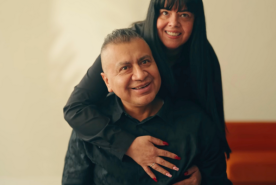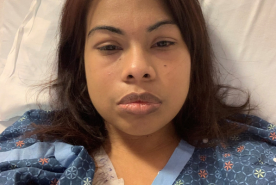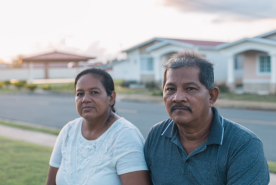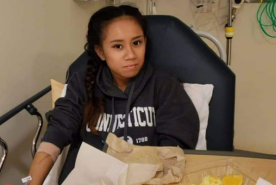September 26, 2023
Elizabeth Dravis and her children were getting ready for the 2020 winter holidays when Elizabeth started feeling more tired than usual. But she shrugged it off. Elizabeth is a single mom, and it was a busy season at work. She had no idea her exhaustion was the first sign that something was very wrong with her health.
From home to hospitalized
After the holidays, Elizabeth, a Director of Clinical Operations and Research at an academic healthcare institution, returned to work.
"It was incredibly busy and stressful. Work picks up immediately after the holidays. Half of my staff were out with COVID-19," Elizabeth said. "I wore a lot of hats and was extremely tired but didn't think much of it since I was so busy."
The weekend after returning to work, Elizabeth decided to lay low, hoping to recuperate.
"I thought if I took the weekend to take care of myself and sleep, I'd feel better and refreshed. That didn't happen. I felt progressively worse over the next few days. I was fatigued like never before," said Elizabeth. "On Wednesday, my legs were swollen and I didn't have the energy to get out of bed and shower. I called in sick and went back to sleep."
By Saturday, Elizabeth was worse than before.
"I passed out. That's when I knew something was not right. My mom told me I looked puffy and wasn't acting like myself," Elizabeth said. “I was admitted to the hospital soon after."
Lab work revealed that Elizabeth's sodium levels and blood pressure were critically low. She also had significant edema (swelling) and was sent to the ICU.
"I had multiple specialists working on me including endocrinology, rheumatology, and nephrology. Other than low electrolytes, everything was coming back normal," said Elizabeth. "The first step was to bring my sodium and blood pressure up."
Elizabeth's nephrologist wanted to perform a kidney biopsy but had to wait until her sodium and electrolyte levels returned where they should be.
Learn more about kidney disease tests and how to read a comprehensive metabolic panel.
Diagnosed with minimal change disease
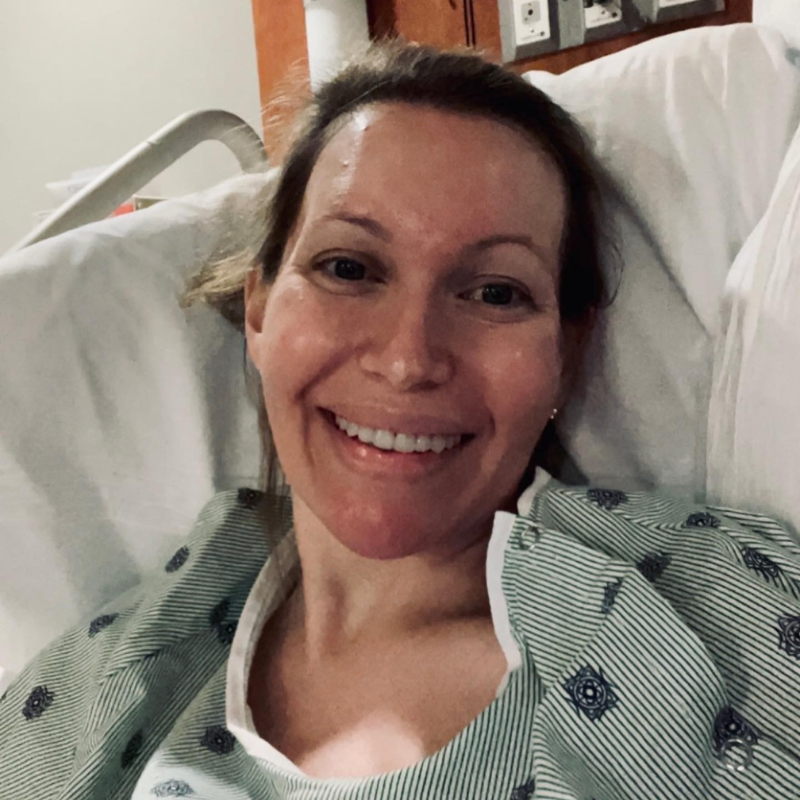
It took three days for the hospital to stabilize Elizabeth's sodium levels. Only then did the interventional radiology department agree to a kidney biopsy.
"The biopsy came back as minimal change disease," Elizabeth said. "With the exception of the nephrologist, no one—not even the physicians or nurses—knew what that was."
Minimal change disease attacks and damages the tiny filtering units, glomeruli, inside the kidney, where the blood is cleaned. It's called "minimal change" because the damage can only be seen through a powerful microscope called an electron microscope.
"I was in the hospital for six days. They put me on high doses of steroids and my body responded very well but it was a long recovery," said Elizabeth. "I weakened a lot during my hospital stay. I didn't get out of bed much, I had no energy, and I had 45 pounds of extra fluid in my body. Over the next five to six months, I gradually got better and my nephrologist tapered me off the steroids."
Then Elizabeth caught COVID-19 and experienced four regressions over the next two years.
"In late April 2023, I had a third regression. I didn't want to take steroids again but my nephrologist compromised with me. I started at a lower dose and thankfully my body responded,” Elizabeth said. “In September 2023 I experienced a fourth regression which I’m still dealing with.”
Even with these regressions, Elizabeth and her healthcare team are still not sure why this is happening.
"We did a full genetic biomarker testing kit and everything came back normal," said Elizabeth. "So, here I am living with minimal change disease. It’s my journey.”
Learn more about minimal change disease.
Lessons learned from minimal change disease

With treatment, Elizabeth was able to avoid any long-term serious health issues, however, a relapse could happen at any time and change that.
"I had some acute kidney injury when I was in the hospital but thankfully no long-term kidney disease. If I continue having regressions, that is a possibility, but for now, there is no permanent damage," Elizabeth said. "I still consider myself healthy but I'm now in the immunocompromised category since I take high-dose steroids. I have to be more mindful of my interactions with people and take better care of myself. I'm very in tune with my body now."
This situation was also challenging for Elizabeth's young children.
"It was very difficult for my children since I hadn’t had health problems before. It was scary for them to see me in the hospital and weak. Once I lost all of the fluid weight, I was much thinner than I had been before. I had to build my strength and energy back up," said Elizabeth. "I have to be very selective about school events and activities. It's been challenging but we've had an open dialogue. They are very curious and inquisitive."
Throughout every regression, Elizabeth explains what is happening and why she's being extra careful with her health.
"Having open communication and letting my children voice their concerns and frustrations, especially when I can't do something I used to be able to do, has been most helpful for them," said Elizabeth. "I've also shared the importance of taking care of themselves and listening to their bodies."
While these health challenges have been tough, Elizabeth has learned a lot.
"My journey has taught me about life and showed me what is most important to me. It's been a wake-up call. I was incredibly sick and my outcome could have been very different had I not gone to the hospital," Elizabeth said. "Your health is imperative. It's easy to get caught up in the day-to-day and ignore the clues our bodies give us that something is wrong. Taking care of yourself, making time for yourself, and listening to your body is really important."
Are you at risk of kidney disease? Take this one-minute quiz to find out. It may just save your life.

